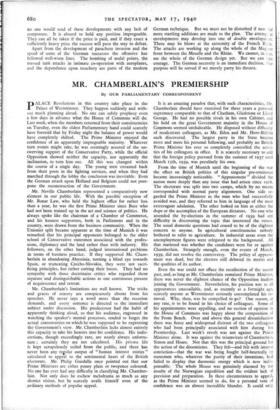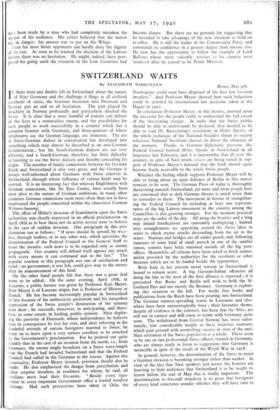MR. CHAMBERLAIN'S PREMIERSHIP
By OUR PARLIAMENTARY CORRESPONDENT
pALACE Revolutions in this country take place in the 1 Palace of Westminster. They happen suddenly and with- out much planning ahead. No one can safely prophesy even a few days in advance what the House of Commons will do. Last week, when the members returned from their constituencies on Tuesday, even the oldest Parliamentary hand could scarcely have foretold that by Friday night the balance of power would have completely shifted. The Prime Minister enjoyed the confidence of an apparently impregnable majority. Whatever turn events might take, he was seemingly assured of the un- swerving support of the Conservative Party, while the official Opposition showed neither the capacity, nor apparently the inclination, to turn him out. All this was changed within the course of a single day. The young men streamed back from their posts in the fighting services, and when they had marched through the lobby the conclusion was inevitable. Even the German attack upon Holland and Belgium could not post- pone the reconstruction of the Government.
Mr. Neville Chamberlain represented a comparatively new element in our public life. With the possible exception of Mr. Bonar Law, who held the highest office for rather less than a year, he was the first Prime Minister since Bute who had not been trained up in the art and science of politics. He always spoke like the chairman of a Chamber of- Commerce, and his keenest supporters, both in Parliament and in the country, were drawn from the business community. When the Unionist split became apparent at the time of Munich it was remarked that his principal opponents belonged to the older school of Conservative statesmen associated with the profes- sions, diplomacy and the land rather than with industry. His followers, on the other hand, judged international problems in terms of business practice.. If they supported Mr. Cham- berlain in abandoning Abyssinia, turning a blind eye towards Spain, or truncating Czecho-Slovakia, they were not sacri- ficing principles, but rather cutting their losses. They had no sympathy with those doctrinaire critics who regarded these separate and distinguishable actions as one continuous process of acquiescence and retreat.
Mr. Chamberlain's limitations are well known. The tricks and graces of oratory are conspicuously absent from his speeches. He never says a word more than the occasion demands, and every sentence is directed to the immediate subject under discussion. His predecessor had the habit of apparently thinking aloud, so that his audience, engrossed in watching the speaker's mental processes, tended to forget the actual controversies on which he was supposed to be expressing the Government's view. Mr. Chamberlain lacks almost entirely this capacity to take his hearers into his confidence. His indis- cretions, though exceedingly rare, are nearly always unfortu- nate; certainly they are not calculated. His private life is kept scrupulously veiled from the public, and there has never been any regular output of "human interest stories" calculated to appeal to the sentimental heart of the British electorate. Mr. Philip Guedalla once pointed out that our Prime Ministers are either penny plain or twopence coloured. No one has ever had any difficulty in classifying Mr. Chamber- lain. Not only does he eschew melodrama as much as any district visitor, but he scarcely avails himself even of the ,ordinary methods of popular appeal. It is an amazing paradox that, with such characteristics, Mr. Chamberlain should have exercised for three years a personal supremacy comparable to that of Chatham, Gladstone or Lloyd George. He had no possible rivals in his own Cabinet, and his hold on the great -Government majority in the House of Commons seemed unshakeable. He disposed without difficulty of recalcitrant colleagues, as Mr. Eden and Mr. Hore-Belisha each discovered. The largest party in the State became more and more his personal following, and probably no British Prime Minister has ever so completely controlled the activi- ties of his colleagues in office. It is scarcely necessary to add that the foreign policy pursued from the summer of 1937 until March Isth, 1939, was peculiarly his own.
From the time of Munich until the beginning of the war the effect on British politics of this singular pre-eminence became increasingly noticeable. " Appeasement " divided the nation more deeply than any issue that had arisen since 1918. The electorate was split into two camps, which by no means corresponded with normal party alignments. One side re- garded the Prime Minister as the man who had successfully avoided war, and they referred to him in language of the most extravagant adulation. The other looked on him as either the dupe or the accomplice of the European dictators. No one who attended the by-elections in the summer of 1939 had any difficulty in discovering the topic that interested the voters. The usual domestic questions had ceased to be of the slightest concern to anyone. In agricultural constituencies nobody bothered to refer to agriculture. In industrial areas even the unemployment figures were relegated to the background. All that mattered was whether the candidates were for or against Chamberlain. Strangely enough, even the events of March, 1939, did not resolve the controversy. The policy of appease- ment was dead, but the electors still debated its merits and the qualities of its author.
Even the war could not efface the recollection of the recent past, and, as long as Mr. Chamberlain remained Prime Minister, there was never the slightest chance of the Opposition leaders joining the Government. Nevertheless, his position was to all appearances unassailable, and, as recently as a fortnight ago, scarcely anyone at Westminster seriously contemplated his re- moval. Why, then, was he compelled to go? One reason, at any rate, is to be found in his choice of colleagues. Some of his appointments were appalling, and no section of opinion in the House of Commons was happy about the composition of the Front Bench. Over and above this general dissatisfaction there was fierce and widespread distrust of the two colleagues who had been principally associated with him during his Premiership. Last week's revolt was not against the Prime Minister alone. It was against the triumvirate of Chamberlain, Simon and Hoare. Not that this was the principal ground for the action of the dissentients. They felt—and felt with intense conviction—that the war wag being fought half-heartedly by statesmen who, whatever the purity of their intentions, had failed to display that daemonic energy which is now indis- pensable. The whole House was genuinely alarmed by the results of the Norwegian expedition and the evident lack of prevision and preparation. In these circumstances to appeal, as the Prime Minister seemed to do, for a personal vote of confidence was an almost incredible blunder. It could only have been made by a man who had completely mistaken the temper of his audience. His critics believed that the nation was in danger: his answer was to put on the Whips. Even his most bitter opponents can hardly deny the dignity of his exit. As soon as he learned the decision of the Labour leaders there was no hesitation. He might, indeed, have post- poned his going until the situation in the Low Countries had become clearer. But there are no grounds for suggesting that he intended to take advantage of the new situation to hold on to office. He is still the leader of the Conservative Party, and commands its confidence in a greater degree than anyone else. He now has the opportunity to follow the example of Lord Balfour, whose most valuable services to his country were rendered after he ceased to be Prime Minister.



































 Previous page
Previous page